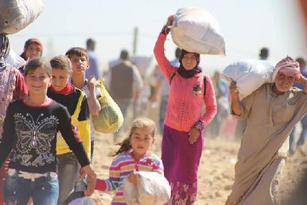
Brussels, 04 December 2014 - The European Commission today adopted a package worth €180 million to deal with the effects of the Syrian crisis in the country itself, as well as in Lebanon and Jordan, who are currently hosting around 1.1 million and 630,000 refugees respectively. This package deals with the longer-term development needs of the refugees and internally displaced persons. It addresses in particular the education of children and young adults, in line with the UNICEF-sponsored “No Lost Generation” Initiative as well as measures to improve the resilience of the refugees as well as the communities hosting them through economic development activities.
Federica Mogherini, High Representative for Foreign Affairs and Security Policy/Vice-President of the European Commission said: "Today, the EU cannot simply watch the suffering of Syrian people without acting. We are ready and willing to bring a continued support to the people of Syria and to the neighbouring countries hosting Syrian refugees. It is time for things to change. We are determined to play our role to the full and bring a lasting political solution to this regional crisis"
Commissioner for Neighbourhood Policy and Enlargement Negotiations, Johannes Hahn stated : "The EU stands by the Syrian people who need all the help they can get in this terrible crisis, as well as the Lebanese and Jordanian people who are under huge pressure in hosting such a high number of refugees. With these funds, 2.5 million children in the region will be given a chance to receive education and to prepare themselves for the time when peace is restored and their skills will be needed to rebuild Syria. I had the opportunity to discuss these matters with the Prime Minister of Lebanon during his visit to Brussels earlier this week.”
Out of the total amount of €180 million, €41 million will provide assistance to the population still inside Syria, €66 million will help Syrian refugees and host communities in Jordan, and €73 million in Lebanon.
Background
The Syrian conflict is having a devastating and lasting impact on Syria and across the region. As of November 2014, with the conflict in its fourth year, the needs of the affected populations are of an unprecedented scale. 10.8 million people inside the country – half of the Syrian population – of which 6.5 million people are internally displaced, are in need of urgent assistance, and more than 3.2 million refugees, plus their overstretched host communities in neighbouring countries need help on a daily basis. The number of conflict-related deaths has surpassed 191,000 individuals and more than one million have been war-wounded.
The Syrian crisis evolved from initially peaceful protests for freedom and democracy that were brutally repressed by the Syrian regime towards a civil war, resulting in a prolonged and ever worsening humanitarian emergency, which today has transformed into a multidimensional and protracted political, security, and social crisis directly affecting several countries in the region - mainly Lebanon, Jordan and Iraq, but also Turkey and Egypt. These countries’ social and economic capacity to deal with the ever-growing influx of refugees is stretched to the limits. The generous hospitality of the host communities is now turning into growing hostility, with borders being declared closed most recently in Lebanon, while additional refugee and internally displaced persons flows have been caused by the advance of the terrorist militia "ISIL" in Iraq, Syria, and Turkey.
The neighbouring countries cannot cope with this massive refugee crisis in the medium to long term without significant additional support from the international community. Furthermore, experience shows that a return of refugees is often a long process even after a crisis ends, which calls for long-term sustainable solutions. This is especially true for Lebanon and Jordan. With their comparatively small population and limited resources, such a burden is posing a growing threat to these partner countries’ economic, social and political stability. In response, the Union budget and Member States have so far mobilised EUR 2.9 billion since the start of the conflict (around EUR 1.5 billion from the Union budget and EUR 1.4 billion from Member States), making it the main world donor in addressing the consequences of this crisis. This assistance has allowed for urgent delivery of humanitarian assistance and supported the national and local capacities to deliver services for those affected by the crisis (education, health, basic services such as water and waste management services, support to livelihoods, etc).
For more information, see the Fact sheet: EU-Syria: €180 million to deal with crisis and spill-over in Lebanon and Jordan
Details
- Publication date
- 4 December 2014
- Author
- Directorate-General for Neighbourhood and Enlargement Negotiations
